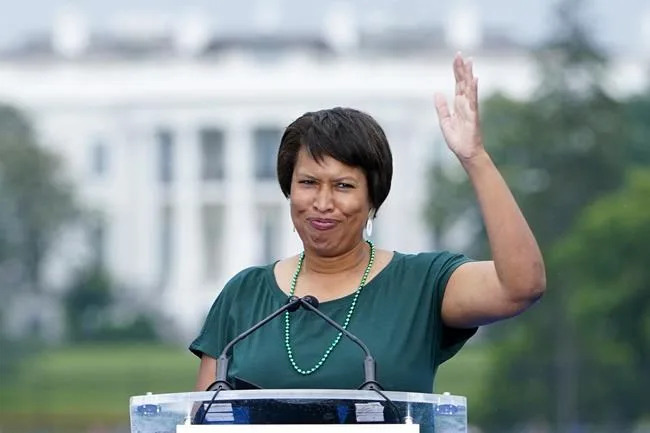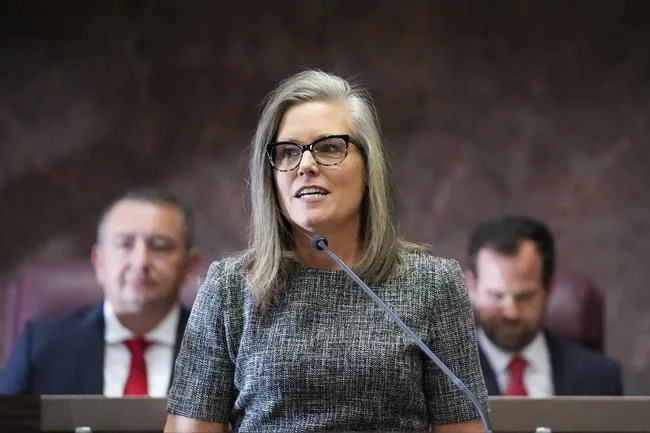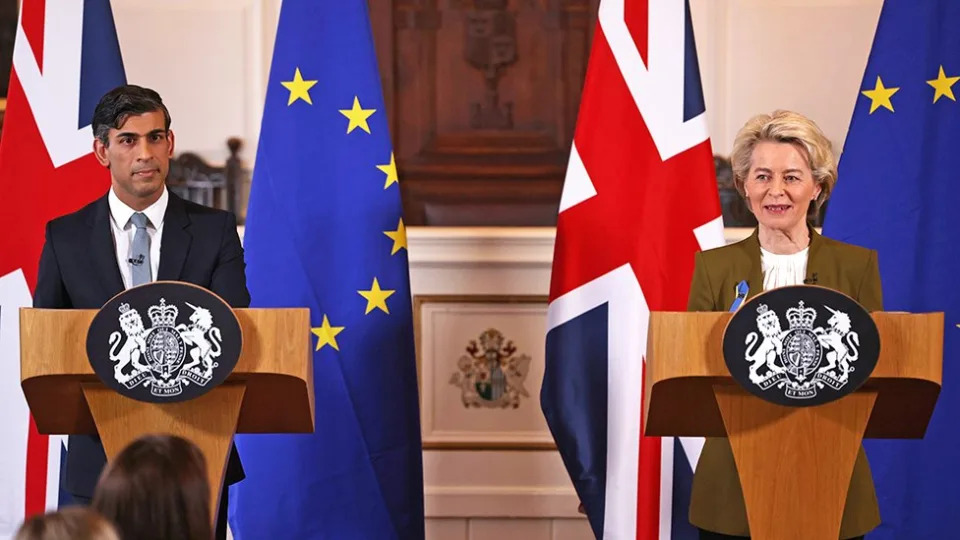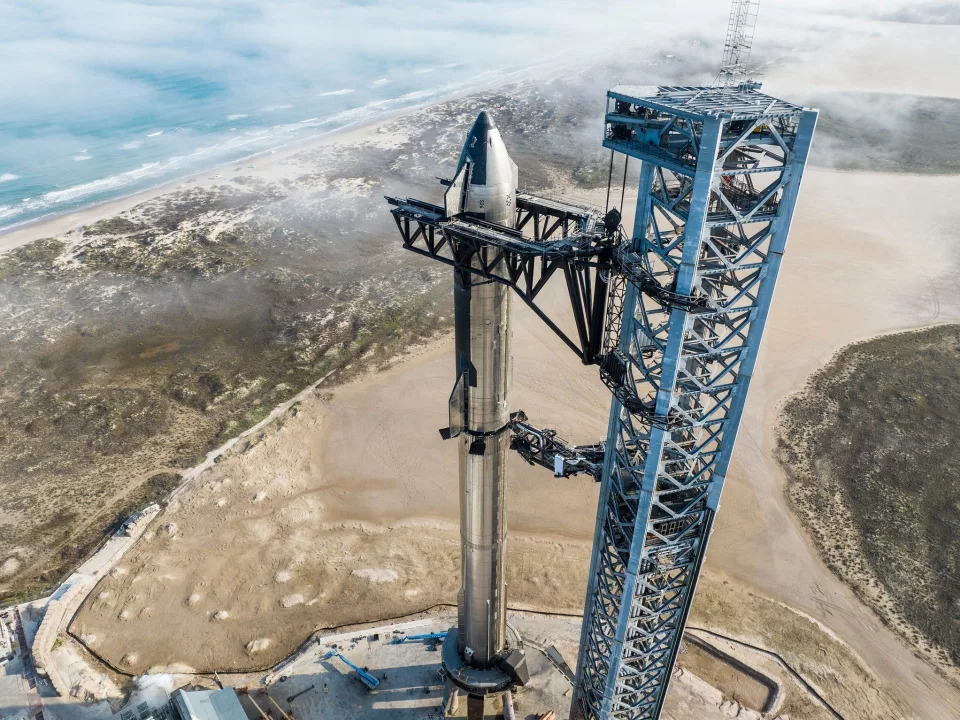GREECE-RAILWAY ACCIDENT-PROTEST-ATHENS
Demonstration protesting the deaths of dozens of people in Greece's deadliest rail accident, between a passenger train carrying more than 350 people and a freight train on Tuesday evening in Tempi valley, near the city of Larissa. In Athens, Greece on March 3, 2023
(Photo by Nick Paleologos / SOOC / SOOC via AFP)
Fri, March 3, 2023
ATHENS, Greece (AP) — Protests have intensified in Greece days after the country's deadliest rail disaster, as thousands of students took to the streets in several cities and some protesters clashed with police in Athens.
At least 57 people — including several university students — died when a passenger train slammed into a freight carrier just before midnight Tuesday. The government has blamed human error and a railway official faces manslaughter charges.
Friday night's violence was not extensive, and the protests were otherwise peaceful. Clashes also occurred in Greece's second largest city, Thessaloniki.
In Athens, riot police outside parliament fired tear gas and flash grenades to disperse a small number of protesters who hurled petrol bombs at them, set fire to garbage bins, and challenged police cordons. No arrests or injuries were reported.
The protests called by left-wing and student groups were fueled by anger at the perceived lack of safety measures in Greece’s rail network. The largest on Friday was in the central Greek city of Larissa, not far from the crash site, where several thousand people marched peacefully. Similar protests were held Wednesday and Thursday.
First funeral in northern Greece
The accident at Tempe, 380 kilometers (235 miles) north of Athens shocked the nation and highlighted safety shortcomings in the small but dated rail network.
As recovery teams spent a third day scouring the wreckage Friday and families began receiving the remains of their loved ones, the funeral for the first of the victims was held in northern Greece.
Athina Katsara, a 34-year-old mother of an infant boy, was being buried in her home town of Katerini. Her injured husband was in hospital and unable to attend.
Harrowing Identification Process
The force of the head-on collision and resulting fire complicated the task of determining the death toll. Officials worked round the clock to match parts of dismembered and burned bodies with tissue samples to establish the number.
The bodies were returned to families in closed caskets following identification through next-of-kin DNA samples — a process followed for all the remains.
Relatives of passengers still listed as unaccounted-for waited outside a Larissa hospital for test results. Among them was Mirella Ruci, whose 22-year-old son, Denis, remained missing.
“My son is not on any official list so far and I have no information. I am pleading with anyone who may have seen him, in rail car 5, seat 22, to contact me if they may have seen him,” Ruci, who struggled to stop her voice from cracking, told reporters.
Flags at half staff
Flags at the ancient Acropolis, parliament and other public buildings around Greece remained at half-staff on the third day of national mourning. National rail services were halted by a strike for a second day, with more strikes planned over the weekend.
Police early Friday searched a rail coordination office in Larissa, removing evidence as part of an ongoing investigation. The facility's 59-year-old station manager was arrested and charged with multiple counts of negligent manslaughter.
Stelios Sourlas, a lawyer representing a 23-year-old victim of the collision, said responsibility for the deaths went beyond the station manager.
“The station manager may have the principle responsibility ... but the responsibility is also broader: There are the rail operators and public officials whose job it was to ensure that safety measures and procedures were properly in place,” Sourlas said.
Rail unions say the network was poorly maintained despite upgrades to provide faster trains in recent years.
ATHENS, Greece (AP) — Protests have intensified in Greece days after the country's deadliest rail disaster, as thousands of students took to the streets in several cities and some protesters clashed with police in Athens.
At least 57 people — including several university students — died when a passenger train slammed into a freight carrier just before midnight Tuesday. The government has blamed human error and a railway official faces manslaughter charges.
Friday night's violence was not extensive, and the protests were otherwise peaceful. Clashes also occurred in Greece's second largest city, Thessaloniki.
In Athens, riot police outside parliament fired tear gas and flash grenades to disperse a small number of protesters who hurled petrol bombs at them, set fire to garbage bins, and challenged police cordons. No arrests or injuries were reported.
The protests called by left-wing and student groups were fueled by anger at the perceived lack of safety measures in Greece’s rail network. The largest on Friday was in the central Greek city of Larissa, not far from the crash site, where several thousand people marched peacefully. Similar protests were held Wednesday and Thursday.
First funeral in northern Greece
The accident at Tempe, 380 kilometers (235 miles) north of Athens shocked the nation and highlighted safety shortcomings in the small but dated rail network.
As recovery teams spent a third day scouring the wreckage Friday and families began receiving the remains of their loved ones, the funeral for the first of the victims was held in northern Greece.
Athina Katsara, a 34-year-old mother of an infant boy, was being buried in her home town of Katerini. Her injured husband was in hospital and unable to attend.
Harrowing Identification Process
The force of the head-on collision and resulting fire complicated the task of determining the death toll. Officials worked round the clock to match parts of dismembered and burned bodies with tissue samples to establish the number.
The bodies were returned to families in closed caskets following identification through next-of-kin DNA samples — a process followed for all the remains.
Relatives of passengers still listed as unaccounted-for waited outside a Larissa hospital for test results. Among them was Mirella Ruci, whose 22-year-old son, Denis, remained missing.
“My son is not on any official list so far and I have no information. I am pleading with anyone who may have seen him, in rail car 5, seat 22, to contact me if they may have seen him,” Ruci, who struggled to stop her voice from cracking, told reporters.
Flags at half staff
Flags at the ancient Acropolis, parliament and other public buildings around Greece remained at half-staff on the third day of national mourning. National rail services were halted by a strike for a second day, with more strikes planned over the weekend.
Police early Friday searched a rail coordination office in Larissa, removing evidence as part of an ongoing investigation. The facility's 59-year-old station manager was arrested and charged with multiple counts of negligent manslaughter.
Stelios Sourlas, a lawyer representing a 23-year-old victim of the collision, said responsibility for the deaths went beyond the station manager.
“The station manager may have the principle responsibility ... but the responsibility is also broader: There are the rail operators and public officials whose job it was to ensure that safety measures and procedures were properly in place,” Sourlas said.
Rail unions say the network was poorly maintained despite upgrades to provide faster trains in recent years.
Election plans delayed?
Greece's center-right government had been widely expected Friday to call national elections for early April, but the announcement and likely date was likely to be delayed.
The passenger train involved in the crash was traveling along Greece's busiest route, from Athens to Thessaloniki. The freight train was heading in the opposite direction, on the same track.
Two of the victims were identified Friday as Cypriot students Anastasia Adamidou and Kyprianos Papaioannou. Cyprus President Nikos Christodoulides said the state would cover the cost of their repatriation and funerals.
Neighboring Albania's Prime Minister Edi Rama announced that flags on public buildings will be lowered to half-staff Sunday, as a mark of respect for the victims in Greece. ___ Gatopoulos reported from Athens. Vassilis Kommatas and Giannis Papanikos in Larissa, Greece, Costas Kantouris in Thessaloniki, Greece, and Menelaos Hadjicostis in Nicosia, Cyprus, contributed to this report.
Derek Gatopoulos, The Associated Press
2/15
GREECE-TRAINS/CRASH-PROTESTS
Protesters shout slogans during a demonstration, following the collision of two trains, near the city of Larissa, in Thessaloniki, Greece, March 3, 2023. REUTERS/Alexandros Avramidis
Alexandros Avramidis / reuters
3/15
GREECE-RAILWAY ACCIDENT-PROTEST-ATHENS
Demonstration protesting the deaths of dozens of people in Greece's deadliest rail accident, between a passenger train carrying more than 350 people and a freight train on Tuesday evening in Tempi valley, near the city of Larissa. In Athens, Greece on March 3, 2023 (Photo by Nick Paleologos / SOOC / SOOC via AFP) (Photo by NICK PALEOLOGOS/SOOC/AFP via Getty Images)
NICK PALEOLOGOS via Getty Images
4/15
GREECE-RAILWAY ACCIDENT-PROTEST-ATHENS
Demonstration protesting the deaths of dozens of people in Greece's deadliest rail accident, between a passenger train carrying more than 350 people and a freight train on Tuesday evening in Tempi valley, near the city of Larissa. In Athens, Greece on March 3, 2023 (Photo by Nick Paleologos / SOOC / SOOC via AFP) (Photo by NICK PALEOLOGOS/SOOC/AFP via Getty Images)
NICK PALEOLOGOS via Getty Images
5/15
GREECE-TRANSPORT-ACCIDENT-DEMONSTRATION
A woman holds a placard reading "corruption-timeless, justice now" in front of the Greek Parliament in Athens, on March 3, 2023, as parallel demonstrations take place, following the deadly accident near the city of Larissa, where 57 people, mainly students lost their lives. - Thousands of Greek students staged sit-ins and demonstrated in Athens and other cities on March 3 to demand justice for the victims of the train tragedy, which occured on February 28, as authorities admitted failures overseeing the rail network. In Athens, over 5,000 people gathered outside the headquarters of Greek rail operator Hellenic Train to voice anger and sorrow over the country's worst-ever rail disaster. (Photo by Louisa GOULIAMAKI / AFP) (Photo by LOUISA GOULIAMAKI/AFP via Getty Images)
LOUISA GOULIAMAKI via Getty Images
6/15
GREECE-TRANSPORT-ACCIDENT-DEMONSTRATION
A woman holds a placard reading "We are angry" during a silent demonstration in front of the Greek parliament in Athens on March 3, 2023, following the deadly accident near the city of Larissa, where 57 people, mainly students lost their lives. - Thousands of Greek students staged sit-ins and demonstrated in Athens and other cities on March 3 to demand justice for the victims of the train tragedy, which occured on February 28, as authorities admitted failures overseeing the rail network. In Athens, over 5,000 people gathered outside the headquarters of Greek rail operator Hellenic Train to voice anger and sorrow over the country's worst-ever rail disaster. (Photo by Louisa GOULIAMAKI / AFP) (Photo by LOUISA GOULIAMAKI/AFP via Getty Images)
7/15
GREECE-TRAINS/CRASH-PROTESTS
A protester holds a piece of paper reading "Criminals", during a demonstration, following the collision of two trains, near the city of Larissa, in Thessaloniki, Greece, March 3, 2023. REUTERS/Alexandros Avramidis
Alexandros Avramidis / reuters
Protesters use fireworks against riot police during a demonstration in front of the parliament building following the collision of two trains, near the city of Larissa, in Athens, Greece, March 3, 2023. REUTERS/Alkis Konstantinidis
Riot police run amid tear gas as they clash with protesters during a demonstration in front of the parliament building following the collision of two trains, near the city of Larissa, in Athens, Greece, March 3, 2023. REUTERS/Alkis Konstantinidis
Protesters attack riot police officers as clashes take place during a demonstration in front of the parliament building following the collision of two trains, near the city of Larissa, in Athens, Greece, March 3, 2023. REUTERS/Alkis Konstantinidis
Protesters leave flowers in Thessaloniki's train station, following the collision of two trains, near the city of Larissa, in Thessaloniki, Greece, March 3, 2023. REUTERS/Alexandros Avramidis
Candles are lit during a silent protest in front of the parliament building following the collision of two trains, near the city of Larissa, in Athens, Greece, March 3, 2023. The candles form the phrase "Call me when you get there". REUTERS/Alkis Konstantinidis
Vigil Held In Front Of Greek Parliament For Train Crash Victims
ATHENS, GREECE - MARCH 03: Greek people pay respect during a vigil outside Greek parliament to commemorate the victims of Tuesday's train collision on March 3, 2023 in Athens, Greece. Fifty-seven people died when a passenger train collided head-on with a freight train on Tuesday near the city of Larissa. (Photo by Milos Bicanski/Getty Images)
Two women hold candles during a silent protest in front of the parliament building following the collision of two trains, near the city of Larissa, in Athens, Greece, March 3, 2023
REUTERS/Alkis Konstantinidis
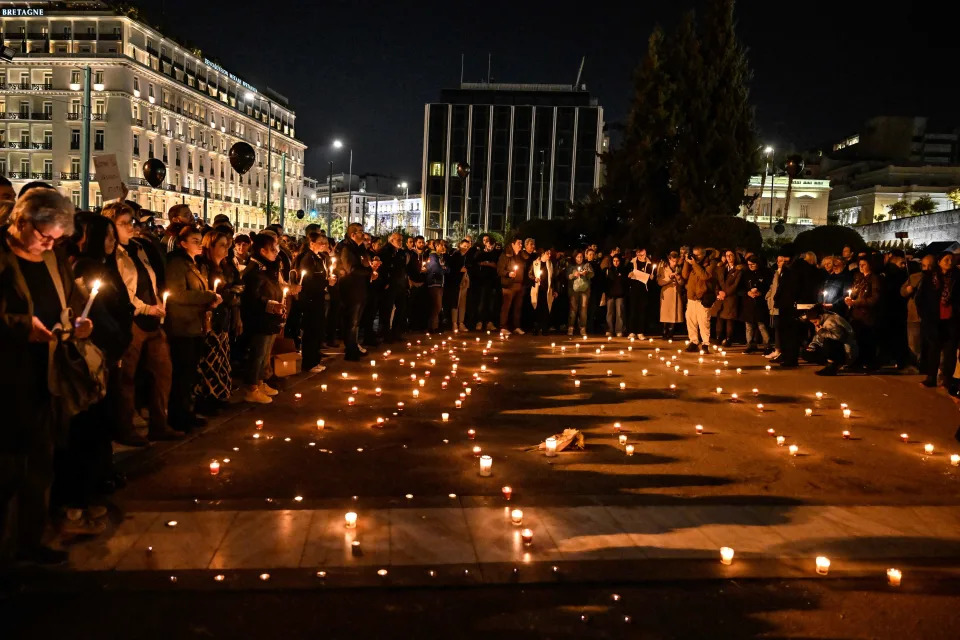
People hold candles and black balloons during a silent demonstration in front of the Greek Parliament in Athens, on March 3, 2023, as parallel demonstrations take place, following the deadly accident near the city of Larissa, where 57 people, mainly students lost their lives. - Thousands of Greek students staged sit-ins and demonstrated in Athens and other cities on March 3 to demand justice for the victims of the train tragedy, which occured on February 28, as authorities admitted failures overseeing the rail network. In Athens, over 5,000 people gathered outside the headquarters of Greek rail operator Hellenic Train to voice anger and sorrow over the country's worst-ever rail disaster. (Photo by Louisa GOULIAMAKI / AFP)
People hold candles and black balloons during a silent demonstration in front of the Greek Parliament in Athens, on March 3, 2023, as parallel demonstrations take place, following the deadly accident near the city of Larissa, where 57 people, mainly students lost their lives. - Thousands of Greek students staged sit-ins and demonstrated in Athens and other cities on March 3 to demand justice for the victims of the train tragedy, which occured on February 28, as authorities admitted failures overseeing the rail network. In Athens, over 5,000 people gathered outside the headquarters of Greek rail operator Hellenic Train to voice anger and sorrow over the country's worst-ever rail disaster. (Photo by Louisa GOULIAMAKI / AFP)



